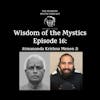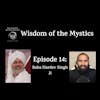Thoughts on The Bhagavad Gita (Chapter 11: Verse 28 - Verse 36)
This episode discusses the 11th chapter of the Bhagavad Gita, specifically verses 28 - 36.
Translation used: The Bhagavad Gita Comes Alive: A Radical Translation by Jeffrey Armstrong
If you enjoyed listening to the 77th episode of the Thoughts on The Bhagavad Gita and want to listen to more episodes like this on the Bhagavad Gita, or on Non-Duality, or the wisdom of the Mystics please follow/subscribe to this Podcast. New episodes are uploaded every Sunday.
Thoughts on the Upanishads, Conversations with the Bearded Mystic, Guided Meditations, and much more only on Patreon, Buzzsprout Subscriptions, Apple Podcast Subscriptions and Supercast.
Patreon: Support The Bearded Mystic Podcast and get ad-free, bonus episodes along with many more benefits:
https://www.patreon.com/thebeardedmysticpodcast
Buzzsprout Subscriptions: Support The Bearded Mystic Podcast and get ad-free, bonus episodes: https://www.buzzsprout.com/1800416/subscribe
Direct & Unfiltered with The Bearded Mystic is a great format to ask The Bearded Mystic (Rahul) whatever question you have in your mind. Submit your question by completing this survey please.
Join The Bearded Mystic Podcast Discussion Group on Whatsapp: https://chat.whatsapp.com/GcCnyrjQwLuEPHBaVA6q9L
Be notified of my weekly virtual meditation session followed by a Q&A Discussion via zoom (Notifications only):
https://chat.whatsapp.com/DcdnuDMeRnW53E0seVp28b
If you would like a one-on-one meeting with me via Zoom, book here:
https://calendly.com/thebeardedmysticpodcast/1on1meetings
Please rate and write a review for this Podcast: https://www.thebeardedmysticpodcast.com/reviews/new/
You can follow me and contact me on social media:
Website: https://www.thebeardedmysticpodcast.com
TikTok: https://vm.tiktok.com/ZMdk3HPJh/
Instagram: https://www.instagram.com/thebeardedmysticpodcast/
Youtube: https://www.youtube.com/c/TheBeardedMysticPodcast/
Twitter: https://twitter.com/bearded_mystic
Facebook: https://www.facebook.com/The-Bearded-Mystic-Podcast
Rahul N Singh:
Hello and welcome to another episode of the Bearded Mystic Podcast and I'm your host Rahul N. Singh. Thank you for taking out the time to either watch or listen to this podcast episode. If you are really interested in supporting The Bearded Mystic Podcast, and you've found great benefit in listening or watching these episodes, then please do support this podcast on Patreon where you can get ad free and bonus episodes along with other benefits depending on the tier that you select. Your support means everything, and it really does help the podcast keep running efficiently and smoothly, and also widens the audience that this message can reach to. If you would like to know more about it, the details are in the show notes and video description below. On Saturdays at 11:00 AM Eastern Standard Time there is a free virtual meditation session along with discussion and Q&A. If you're interested in meditating with us as a community, then you can find out the details in the show notes and video description below. Please do like, comment, and subscribe if you're watching this on YouTube and if you're listening to this on your favorite podcast streaming app, then please do give this podcast a five star rating. It helps the podcast get up in the charts and allows the algorithm to bring this podcast to new listeners and also do review the podcast if you can and make sure you do follow or subscribe to keep getting future episodes. Today, we will be continuing on with my thoughts on the Bhagavad Gita and we will be looking at specifically chapter 11, verse 28 to verse 36. So far, we've gone through what the Virat Roop is and we know that in the last episode, we discussed how Arjuna now feels scared, terrified at what he has seen even though he asked for this vision he's not totally comfortable with what he's discovered. Now that's what happens when we ask for something prematurely in spirituality but the greatness of the master is when the disciple Is brought back to their senses and this is where the Master becomes so important, or the guru becomes so important because the guru has to then stabilize and bring the disciple back to a state of being where they can function in the world, but not allow the world to harm them in any way. The one thing we've learnt from the Bhagavad Gita so far is, and this message keeps getting re emphasised and re emphasised, there is only, only Nirguna Brahman. The Virat Roop that we see is basically this whole universe and possibly many universes. It has many attributes, yet the one thing that underlies all these attributes is this awareness. This awareness is formless, this awareness is limitless, this awareness is infinite, this awareness is imageless, nameless and so on. This is what Sri Krishna really is, this is what our Guru really is, but when we are not understanding of the Truth, then we fall under the ground of, well you know what, it must be separate. Many people due to this chapter 11, they tend to say Krishna is different to Nirguna Brahman. And this is because they are already dualistic thinking. And where Sri Krishna establishes non duality in the second chapter, it seems that people forget that important lesson. So my word of warning when it comes to this specific chapter and the episodes, that ultimately, when we say Saguna Brahman, when we say... Ishvara, when we say Sri Krishna, when we say Vishnu, when we say the Shared Being, we are truly meaning in the end, Nirguna Brahman. So I want to make that clear. It's important we make that clear because without the right knowledge, we will not progress. The other aspect is a lot of people go back to dualistic thinking because it's more comfortable. For example, in the last chapter, Arjuna then says, you know, have mercy upon me. We shouldn't have to get to that point. And although that implies dualistic thinking, remember, Arjuna is still going through the process. And if you fully embrace that you are Arjuna, then you should also go through the process as he does. But let me make one thing clear, at the end of chapter 18 when we've concluded, one should be established in non duality. If not, then go right to the beginning and to the end. It's important that we do this. Now... Let's start with verse 28. Just as the many streams of the flooding river rush and swell with turbulence into the ocean, so those many warriors, those heroes among men, race to their destruction and enter your flaming mouths. One thing we can establish here is that Arjuna is continuing on, describing what he is seeing and we know that in the last episode we know that all these people are racing towards that gaping mouth which will destroy them with its razor sharp teeth. So we know here what Arjuna is trying to say and we're looking at the whole verse together. But it's a great way for Arjuna to describe the Virat Roop, so we can imagine it somewhat. And he says, just as the many streams of a flooding river rush and swell with turbulence into the ocean. So you can just imagine, you know, so many rivers, so many streams entering and, it's all very turbulent and, they're crashing into each other. We can imagine that, and you can imagine that now being... All the people in the war, all of humanity, all the living beings, all the planets, everything is racing towards destruction. The river symbolizes the many warriors or human beings, the heroes among humans, and they all face their destruction in the ocean. Once the river enters the ocean, the river doesn't exist. It's only the ocean. Likewise, once we enter into the flaming mouth of this virat roop, the Shared Being, we face our destruction. Therefore, there is no such thing as naam and roop once we enter that Being. But this is where, when we have utilised our viveka, can we get to that understanding. So you could say all of this is the flaming mouths of the Shared Being, so there's many, not just one, in all directions you could find these flaming mouths. The rivers are aplenty and all merge with the ocean, they appear as many, but it is simply water. Likewise, we have many names and forms but we are entering into that One, Unified and Infinite Consciousness. Infinite consciousness meaning infinite mouths, we are all racing towards jivan mukti, we are all racing towards liberation, towards freedom. So it doesn't matter who you are, whether you are a saint or a sinner, all must travel this path with the body and mind. Whoever has a body and mind, whoever has some name and form. We are all travelling on this path towards destruction or transcendence. Only enlightened beings are able to complete this journey before death, hence they are called jivan Mukt. They burn their body and mind identity with the fire of Brahm Gyan. This is the hope for all of us as we go deeper into these episodes and as we go deeper into understanding the Brahm Gyan, that it's all about understanding that we need to burn away our ignorance, burn away our ego, burn away anything that limits us. Verse 29. Just as moths fly at great speed to certain annihilation in the flames of a blazing fire, so these many beings rush from this loka to another, racing to their destruction in your fiery mouths. Again we are going to look at the whole verse all together. We may have witnessed this in our very own life, when we've been growing up, it's more fascinating, but you always, I remember growing up and always seeing the moth go towards the light and even though the bulb was burning hot, it would still just try to go into the light and flicker around it. So as the moth goes towards the light. Likewise or towards fire say if there's a fire burning they will go towards the light of the fire and even though this fire will burn it, it will annihilate it and it will destroy it completely, it's destined to do so because of its instincts. Just on a basic instinct level, that's what it's going to do, that's what it is programmed to do and here arjuna uses the imagery of a moth to highlight to us how it's done when we have the imagery of many moths diving into a blazing fire. He says they go at great speed likewise many beings of all kinds from different lokas travel to other lokas only to race to their own destruction, towards death. To be captured by death. One thing to understand here is that even if you say you live in deva loka or if you live in Svarga Loka or Heaven or whatever, you still have to come back onto the Earth- Bhumi Loka. And there again, you're gonna have to face your destruction or face your transcendence. The the choice is with you on what you wanna do. Ultimately, the name and form, whether you are enlightened or not enlightened, is going to get destroyed. Once this body has met its capacity to hold the jiva, when it's no longer able to do so, it will let go. We are all rushing towards death, every one of us. Many of us simply do not live in the moment and if we did live in the moment, time would slow down and we would appreciate life a lot more. Nowadays we have this thing about being occupied all the time, you know, we got to keep ourselves busy. Even in our down time, our down time is doing more tasks maybe at home, rather than doing work at the office or doing studying. We are rushing towards life, and this is what's happening with us, we're rushing towards death. We don't look to look after the body or the mind, and we simply do not even seek help when we should be seeking help. Again, our life is stuck in the rat race, over consumption, comparison of all kinds and we're just rushing towards life. People think about hustling all the time. You know, I've spoken against that type of culture. I'm even against the culture now of motivational speakers. They all motivate you and make you feel good, but it's like a dog that is tasting a bone. He thinks the bone is tasty, but he's tasting his his own blood. And likewise, we get motivated just by sitting down and watching a video but actually we're doing nothing. Nothing that will really provide meaning to our life and we are never stable. That's the one thing I love about podcasting. It's long form. I have to be consistent and I have to love it. If I don't love it, I wouldn't be able to do it and it's true you find ways on how to really make your passion work but that doesn't mean that you do it to a point where you rush it or you cause harm for yourself. No. That's not the way. One does things with great ease. Then the other aspect is over consumption. Over consumption of information, over consumption of buying products. Nowadays there's this thing about not wearing the same thing twice. I think that's crazy. People who say that they've worn something once and change are the most obnoxious people you can come across. Because... there's nothing wrong with you wearing the same thing again. Nobody cares and you know what's funny is that people say well they don't care what people think well you do because that's why you can't wear the same thing again because you're worried that other people say you have no clothes. Well obviously you have clothes but you're not comfortable in your own skin to say so. So it's interesting when we are over consuming, it means our mind isn't stable. Hence we're rushing through life. Hence you find that our destiny is that we are all to be destroyed one day. So even the clothes you wear, they're not going to matter. In this life that we have of, say we all live to 80 to 100 years, it's nothing in the scale of the universe. And one day, we have to choose whether we want to... enter back in, or live a life of eternity, live a life of infinity, where we are no longer just this one form, but we are all forms and yet of no form too, when we are Saguna yet ultimately Nirguna. Then verse 30. O great Vishnu, you are licking the lips of your flaming mouths and swallowing everyone on all sides. Filling the lokas with intense radiation, your terrible blazing rays are burning everywhere. Very interesting and I kind of like the imagery. Again, he mentions Vishnu ji here and that's to show what he's seeing in front of him. He's acknowledging that it's not Sri Krishna, but it is Vishnu. And to ensure none escape this fire, you're told that, you know, he says, you are licking the lips of your flaming mouths and swallowing everyone on all sides. You're not letting anyone pass by. Everyone is being swallowed up in this fire. It is devouring everyone and it shows that there is no way one can avoid this. It's simply impossible. There's no point even trying. And these lokas or these realms are filled with intense radiation. So within this Shared Being, there's this intense radiation, both from the heat and light and that is to remind us that this whole of existence is full of unknown powers that we do not know. Unknown forms of energy that we are not aware of. And that can easily destroy us depending on what form we have. These rays are burning everywhere, there's not one place where these rays aren't burning. So this terrifying form is pervading everything, but this is also a hint of Arjuna's mind, how his ego is also getting burnt up in this witnessing of this magnificent virat roop. And at the same time it's also showing that his mind is now being devoured by the Shared Being. So there's many ways we can see this, but it does give a hint of what Arjuna's mind really is in. What state of mind he is in. Then verse 31. O Supreme Being among the Devas, I bow before you. Prasida,'please be kind and merciful' unto me. Your terrible cosmic form is very painful to look at and appears to be destructive. Please tell me who you are, O Bhavantam Adyam,'the greatest primal being'. Please explain your purpose. Let's break this verse down. So first of all, he says, O Supreme Being among the devas, I bow before you. So Vishnu is the Supreme Being in the Vaishnava tradition, but remember, all is Brahman, and Brahman is the only thing that is. But it's highlighting the importance of Vishnu among the other devas here, and it's meant to appease the horrifying form that Arjuna is viewing. If you ever come across like an image of Sri Krishna or Shri Ram or Vishnu, they're very calm, very gentle, very still and so this form that Arjuna is seeing, he knows that the only way, it's as if he's trying to remind Sri Krishna that he's Vishnu. But ironically, Sri Krishna is trying to tell Arjuna, well you're not this name and form that you have, you're something else. The very form that you're witnessing is the very form that you are, but it may take him some time to understand this. And then Arjuna bows in humility, and maybe somewhat fear, there may be some fear, hence he's bowing in front of Vishnu Ji, but remember the devas are all within Vishnu. And remember, this is just for the sake of the Bhagavad Gita. If you read anything related to Shakti, then all the devas are within Shakti, and Shakti is the supreme. Same thing with Shiva Ji. So don't take things too literally. But understand the significance according to the tradition Then he says Prasida,'please be kind and merciful' unto me. Your terrible cosmic form is very painful to look at and appears to be destructive. This is interesting. Again, he's pleading towards the Shared Being and saying, be kind and merciful, Prasida, Prasida, Prasida. You know that he's really wanting this form to be kind and merciful unto him. He feels that what's happening to him now is not kind and merciful, although his wish has been granted, and I would consider that to be kind and merciful, Arjuna obviously feels differently, he finds it terrible, and it's painful for him to see, he's never come across this before, and yes, it would be painful, because imagine, you have... This terrifying form that you never wanted to imagine, that you never thought you would see in a nightmare, is now being told to you that it's divine. And he says it appears to be destructive. Arjuna knows that nothing is ever destroyed. He knows that everything continues, but that's why he says, appears to be destructive. This isn't destructive, everything gets recycled. This is what Arjuna really means, but obviously here, he wants to tell you that it appears to be destructive. And all really that happens is that the jivas just wear new costumes, meaning they just get new name and form. Then the last part of the verse is, Please tell me who you are, O Bhavantam Adyam, which is the greatest primal being, please explain your purpose. So we will go into what the purpose is in a minute, but he says something, he says Adyam. Now if you look at in the Christian Bible, they say that Adam is the first person. So here he says the greatest primal being. And the word the, the word Sanskrit word used is Adyam. So it's very similar. And remember this was written way before the Bible. Despite asking Sri Krishna to reveal his universal form, he still asks for it to be revealed about who he is, so you know he says, tell me who you are, please tell me, please tell me. Well, he's showing you who he is, but you're obviously not accepting it. And he's called Vishnu, but you just don't know whether he's confused or he's just overwhelmed. It's really hard to tell, but you know that there's fear in him, when he sees Sri Krishna's Virat Roop, he doesn't know how to take it. Then he says, he's the greatest primal being, saying these kind words, most likely to calm himself down and maybe to calm down Sri Krishna. He wants to know the purpose, you know, why all this destruction, why all this fire burning, why these eyes and arms and gaping mouths everywhere, why those sharp teeth in many mouths and they're crushing people, you know, skulls are crushed and all this. You know, what is the purpose of this shared being? This is what Arjuna is asking. In verse 32. Now we come to Sri Krishna, Sri Bhagavan said: I am Time, the destroyer of all material worlds. Even without your actions, I am going to annihilate all the warriors standing across from each other on this battlefield, except for you and your brothers. Now he speaks. Now he decides to tell him the outcome. Now let's look at the first part of the verse. Sri Bhagavan said: I am time the destroyer of all material worlds. With this question, Shuk Krishna stops with the appearance of his shared being, calms it down and comes back to his self. That Ojin recognizes. If Arjuna stayed, he could have seen a lot more, and it may have been more beautiful but he didn't and he went forward and pleaded and asked questions to avoid seeing any more. Sri Krishna refers to himself as Kaal, or what we may know as Maha Kaal, and that is the destroyer of all the material worlds. Time destroys everything, we know this. Time is the ultimate thing that we do not have any control over. We are given it in limited supplies in our separate beings but it is Kaal that decides death. When Kaal ends then life ends. Sri Krishna is normally seen as Mahakaal too, so this is another way of Sri Krishna saying that he is one and all with the trinity of the Hindu pantheon which is Brahma, Vishnu and Mahesh or Shivji. The purpose, as he says, is to be the destroyer of all material worlds, that is his purpose, is to destroy everything that is with name and form. Then he says, even without your actions, I am going to annihilate all the warriors standing across from each other on this battlefield except for you and your brothers. Very, very important statement because Sri Krishna makes it clear that Arjuna can actually decide to do nothing. He can take a back seat and not do anything. But everything is subject to destruction regardless. The outcome is going to remain the same. He tells Arjuna, literally, this is what's going to happen, accept it. He wants Arjuna to understand that even if he goes back to his previous request after seeing this terrifying form, that he wants to do nothing, then all the beings he would have killed would still get killed and would still be destroyed or annihilated. So there's no point in him believing that none of this is going to happen if he decides to sit down and be upset. That's why in the next verse he says, in verse 33. Therefore, Arjuna uttishta,'stand up' and achieve fame and honor for performing your dharma as a warrior. After defeating your opponents you will rule over a noble and prosperous realm. As the Supreme Being, I have already decided the outcome of this conflict and you are merely my instrument. He couldn't get more clear, but let's break this verse down. Therefore, Arjuna, uttishta'stand up' and achieve fame and honor for performing your dharma as a warrior. After defeating your opponents, you will rule over a noble and prosperous realm. Again, he tells Arjuna to stand up and do his dharma as a warrior and fight. If he wants to get fame and honor in this world and wants to be remembered by everyone as a great warrior, then he needs to fight. That is the calling for him. He will have to honour this if he wants to complete his dharma, his righteous path of a warrior. People will honour him, the devas will honour him, existence will honour him if he takes up this task of destroying his enemies. There is absolute victory at hand because there is no option for defeat. As it says, after defeating your opponents, you will rule over a noble and prosperous realm. This is basically saying, you're going to win, and this is what you're going to do. And nobility will keep everybody safe, and prosperity will keep everybody happy. This is what we need in society today. We need to ensure that everyone is safe, male and female, or non binary or, anyone, regardless of their sexual orientation, their race, their colour, their ethnicity, society needs to be able to keep everybody safe. Therefore, that is a true embodiment of nobility. And same thing with prosperity. Everyone has the basics required in life. Therefore, everyone can remain happy and content. Then Sri Krishna says, as the supreme being, I have already decided the outcome of this conflict and you are merely an instrument. So this next part of the verse really makes it very clear, that as the Shared Being, the outcome of this conflict has been decided, there's no way out of this outcome, this is what is going to happen. Nothing will change it, no situation will change it, now everything is decided. Arjuna has to see himself as the instrument and go accordingly, be an instrument for peace, be an instrument for prosperity, nobility and as an instrument Arjuna will not face the consequences of his actions if he remains as Formless Awareness. If he understands that he's just an instrument of the Lord, he will be fine, then no karma will be collected, but the moment he feels that he has killed people, that karma will pay heavy in his mind. Verse 34, By My decree, Drona, Bhishma, Jayadratha and all other heroes and warriors are already destined to perish. So do not tremble or hesitate. Go forward in this battle, fight with the adversaries and you will triumph over them. Sri Krishna is addressing the doubts and fears that Arjuna may actually have about the war, may still possess them. So he tells them that through his order, his command, his hukam, that all the heroes and warriors are destined to perish. Even the great ones like Drona who is his Guru, Bhishma who is the head of the family, Karan and jayadratha are all destined to die, even Duryodhana, he is destined to die too, so Arjuna should not tremble or hesitate, he needs to be resolute in his mind, he needs to know that this is what he needs to do, he must fight his enemies In the war and not think twice. He should go forward and fight in the spirit of yoga. Knowing that there is only this One. Arjuna will win this conflict and this is the guarantee that Sri Krishna gives here. And remember, all this must be done in yoga, in true union, then all of our adversaries like our name and form, our attractions and aversions, our desire and anger, and anything else that takes us away from spirituality, one must fight with a steady mind and resting in the awareness of the Atma, in the awareness of Formless Awareness, of Nirankar, of Nirguna Brahman, and that is what needs to be done. Verse 35. At this point, Sanjay spoke to Dhritarashtra: After hearing the words spoken by Sri Krishna, Arjuna held out his hands in the Anjali mudra of reverent offering bowing with palms joined, Arjuna trembling, and very frightened, began to speak to Sri Bhagavan in a plaintive and stammering voice. So this is a very interesting thing to do and we're going to look at the whole verse together. Sanjay looks at the blind king who has just been told that his side will lose the war. Now you've just had this declared and the annihilation of the other side has now been established. So after all this time of conflict, his lack of resolving the issues between his son and the Pandavas will have a crushing defeat. He will lose the kingdom, the very kingdom that they unrighteously have kept to themselves. So Sanjay also wants to highlight why having Sri Krishna is more important than the vast army that Duryodhana had picked from Sri Krishna. Sri Krishna also understands that his own army is going to be destroyed by himself. And it shows that with Arjuna surrendering to Sri Krishna, that is the highest task to do. If you can surrender yourself to the Lord, nothing more is required, then the Lord will work through you. Then he bows down with palms joined, again this shows his intense and immense humility, something I feel should be really respected. He's obviously, you know, trembling and frightened, it's understandable, his journey has been quite intense, from severe anxiety in the beginning, to some level of stability, and then he sees this Virat Roop, and this was scary enough to remind him that he will have to kill his loved ones, and he goes back to square one of feeling that fear. So there's a lot going on for him at this point and his voice is sad and he is stammering which shows his hesitation but he's built up his courage which shows the power of yoga that Sri Krishna has given. He can do it, he will do it and he will get rid of that hesitation and that stammering. Verse 36. Arjuna said: the entire universe delights in seeing you and sings your praises while the asuras and rakshas are frightened and run in all directions. Meanwhile, the gathering of siddhas and other perfected beings bow before you again and again. Let's break this verse up. Arjun said: the entire universe delights in seeing you and sings your praises, while the asuras and rakshas are frightened and run in all directions. Every living being loves being in the awareness of this True One. We experience it mainly in deep sleep, but some of us are able to do it while we're awake. So we love being in the awareness of this True One. The world sings its praises and chants his name through various mediums, various religions, various spiritual institutions. At the end of the day, for some it's Sri Krishna, for someone else it's another name, it's the Dao, whatever one wants to call it. Eventually, all praise and chant that One Name. Everyone takes the shelter of that One at all times, whilst those who are in ignorance, whose conduct is full of evil tendencies are also frightened by the Lord, because nobody wants to be burnt through those flaming mouths. Hence he says, while the Asuras and rakshas are frightened, they run in all directions. They run away, they cannot face the truth, they cannot be in the company of the truth. So they are always running away, they are always looking for a way out. And they run away in all directions, which shows that their conduct is not clean, is not clear, and they know that they are going to be ending up going back to either narak, which is, some people interpret as hell, but it's the lok, which is Patal Lok, which is basically a lower, realm where people will be in suffering. Then in the next part of the verse he says, meanwhile, the gatherings of siddhas and other perfected beings bow before you again and again. So the enlightened beings all gather together to remember this One Lord. They spend all their time to think and contemplate upon this Truth and remain fixed upon the Truth. They are able to focus completely on this Truth and that is what life is all about. These perfected beings who remain in constant awareness are stabilized in their mind. They will not be struggling against seeing this Virat Roop, they are totally comfortable with it, they are totally chill with it, there is nothing wrong with them when it comes to looking at it one on one. They are confident and full of gracefulness, they have no issue in bowing because they are always forgiving others, kind to others, loving to others, patient with others. We must always bow down to our Guru and, or Formless Awareness when we feel a hint of separation. We understand here that keeping the company of the right people, these gatherings of siddhas and other perfected beings, they always bow down to the Lord again and again, which highlights the importance of devotion and why even when we do nirguna bhakti, we are bowing to Nirguna everywhere, in everything, and understanding that its presence is so close that we automatically get into that feeling of devotion. So that is the end of today's episode. Thank you very much for listening. If you liked what you heard and liked what you watched, please do share this podcast with your friends and family who may enjoy this content. Do follow me on social media to keep getting updates. Join the Bearded Mystic Podcast WhatsApp community group to continue the podcast discussion, details are in the show notes and video description below. If you would like to support the Bearded Mystic Podcast as we discussed earlier, do check out the podcast Patreon page. Your support means everything, and it helps this podcast keep running. Details are in the show notes and video description below. Please do rate this podcast five stars and do give a review either on your favorite podcast, streaming app or on our website. Details are in the show notes and video description below. Please do like and comment on this video and subscribe to this YouTube channel. Do follow or subscribe to this podcast on your favorite podcast streaming app. Thank you very much for listening to this episode. Let's end with the Shanti mantra and the Soham mantra. Soham Soham. I am That. I am That. Aum Shanti Shanti Shanti Aum Peace Peace Peace Namaste.
New to The Bearded Mystic Podcast?
Here are some great episodes to start with. Or, check out episodes by topic.















